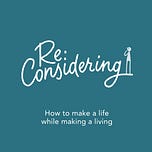An apology can mend old wounds, reunite people, and heal communities. Despite the potential power it can have, a good apology is hard to find. There's a simple structure to a good apology we should all have memorized along with the traits of a bad apology that will only lead us into pain and misery.
In this episode, we're going to the apology experts for guidance, Marjorie Ingall and Susan McCarthy, authors of the book “Sorry Sorry Sorry: The Case for a good apology” and founders of SorryWatch.com. Marjorie and Susan teach us how to make a good apology and give examples of bad ones. Learning this essential skill will help you preserve and strengthen the most consequential relationships in your life. What could be more important?
Resources from this episode
About Marjorie Ingall
Marjorie Ingall has written for many magazines and newspapers, including Tablet (where she was a columnist for a decade), The New York Times, Ms., Food & Wine, Wired, Self (where she was a contributing writer), Glamour (where she was a contributing editor), and Sassy (yes, that one), where she was at one time or other the senior writer, health editor, and books editor, and won several awards for health and social issues coverage. She’s the author of Mamaleh Knows Best; the co-author of Hungry, written with the model Crystal Renn; the author of The Field Guide to North American Males; a contributor to Here Lies My Heart: Essays on Why We Marry, Why We Don’t, and What We Find There (Beacon); and the co-author of Smart Sex (Simon & Schuster), a now-retro guide for teenagers. She’s also a former writer/producer at the Oxygen TV network, where, in a meeting with Oprah, she saw Oprah’s giant diamond earring fall out of her ear, get entangled in her sweater and dangle temptingly above the conference room floor. Ingall considered leaping for it, plucking it from the angora and fleeing to pay off her mortgage, an impulse for which she does not apologize. At the end of her rousing and mesmerizing pep talk, Oprah (who had not given any indication that she had noticed the fallen earring) coolly picked up the earring and placed it back in her ear. This is why she is Oprah.
About Susan McCarthy
Susan McCarthy is the author of Becoming a Tiger: How Baby Animals Learn to Live in the Wild (HarperCollins) and co-author with Jeffrey Moussaieff Masson of When Elephants Weep: The Emotional Lives of Animals (Delacorte). A modest person, she seldom mentions that the latter book was an international bestseller.
Publications she’s written for include Discover, Guardian.co.uk, Outside, Parade, Salon, Smithsonian, and Wired.
McCarthy wrote a piece for Salon on apologies (“How to Say You’re Sorry: A Refresher Course”) which has been lastingly popular, and which has encouraged her to think more about the matter.
McCarthy writes about animals on the blog The Nature of the Beast (According to Susan McCarthy). This combines observations about animals, humor, and sometimes drawings. Take a look. If you don’t like it, too bad. She’s not sorry. Except for herself.











